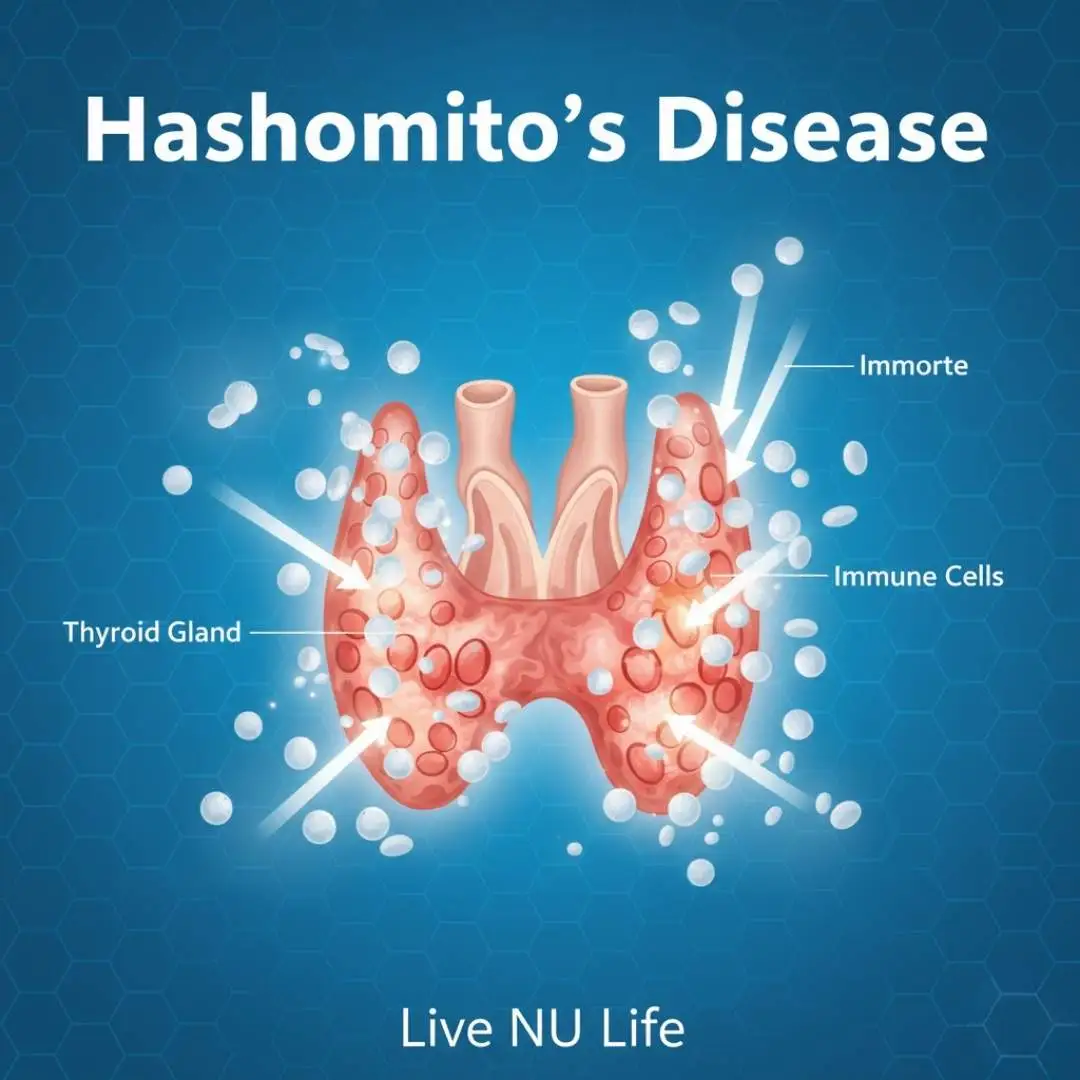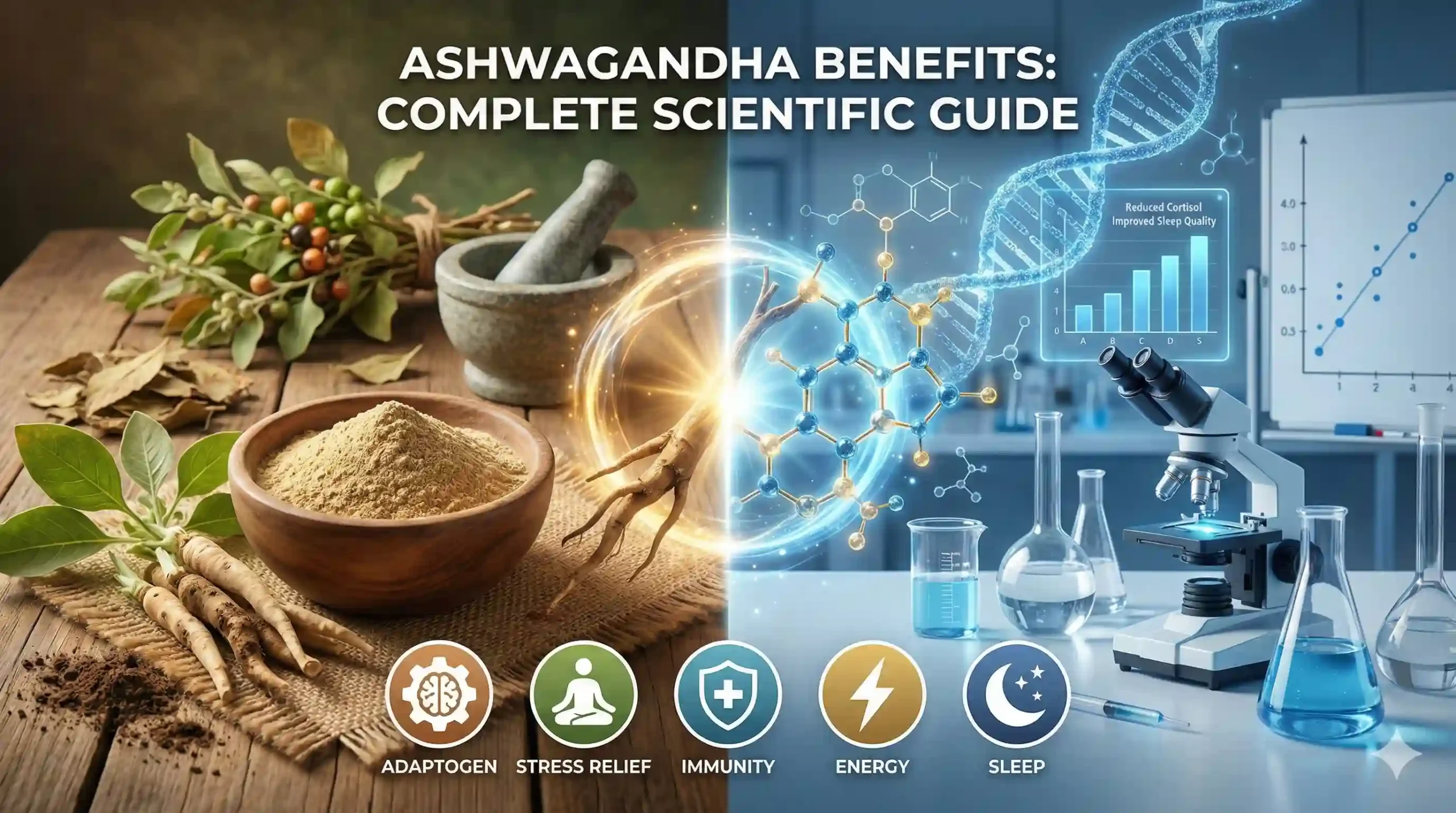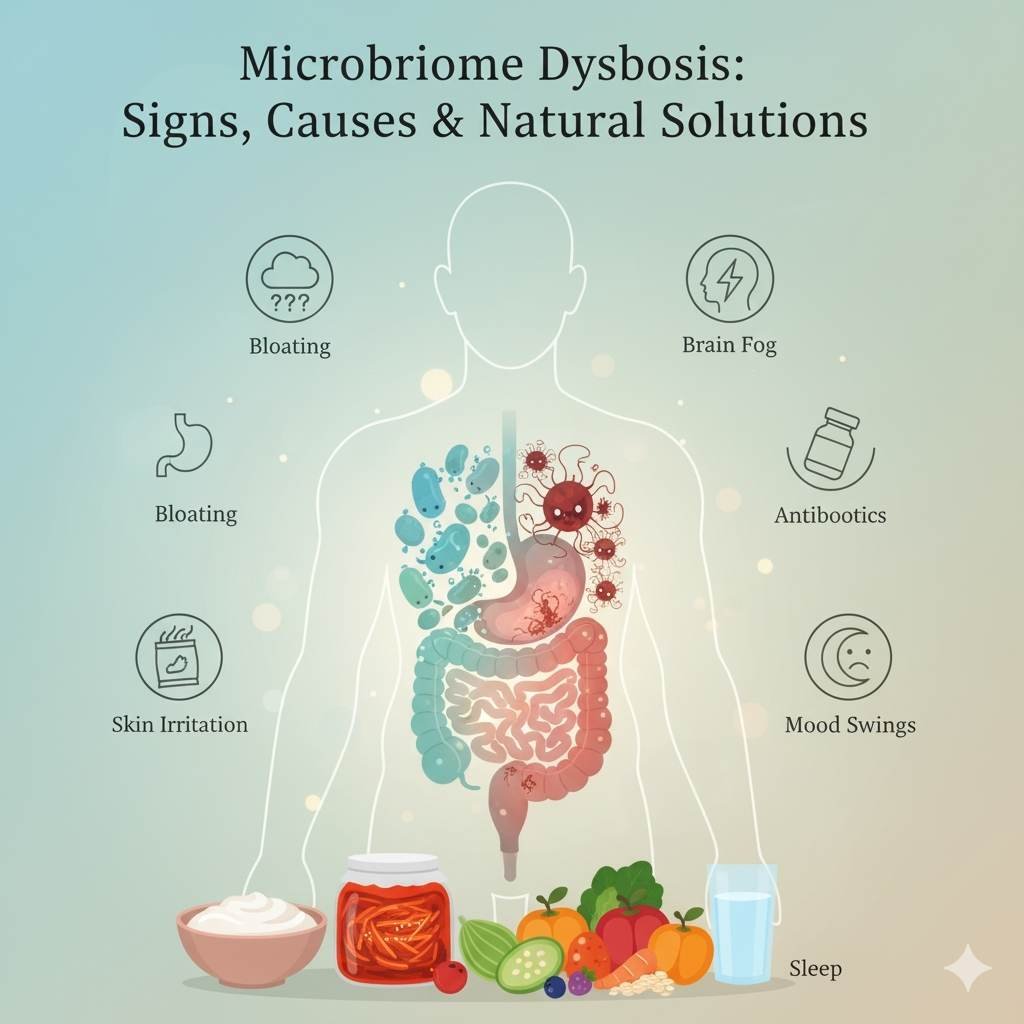Hashimoto’s Disease: Causes, Symptoms, Treatment, Diet & Complications Explained
Hashimoto’s disease affects millions of people around the world. It makes your thyroid work slower than it should. Your body starts attacking its own thyroid gland. This causes big problems.
Your thyroid is like the shape of a small butterfly in your neck. It makes such hormones that control your body’s working system. When you have Hashimoto’s disease, your immune system thinks your thyroid is bad. So it attacks it.
Most people don’t feel sick at first. The disease moves very slowly. You might not notice anything for years.
Common symptoms include:
- You may feel tired all the time
- You may experience sudden weight gain without eating more
- Feeling cold when others feel warm
- Dry skin & hair that breaks easily
- Feeling sad or forgetful
- Pain in joints & muscles
Women get this disease more than men. It usually happens to people aged 30-50 years. If your family has a history of thyroid problems, you are most likely to have it
Doctors still don’t know exactly how this disease happens. Your genes play a part. Some viruses might trigger it too. Unlike Graves’ disease, which makes your thyroid too active, Hashimoto’s makes it too slow.
Treatment can help people overcome this. Doctors also give you thyroid pills to replace missing hormones. Eating the right & healthy foods also helps. You should stay away from too much sugar & processed foods.
If you get timely help, that makes a big difference. Simple blood tests can find the disease. Don’t ignore feeling tired or cold all the time.
What is Hashimoto’s disease, and how does it affect the thyroid?
Hashimoto’s disease happens because your immune system, after getting confused, attacks your thyroid gland. This small gland is present at the base of your neck & makes hormones which control how your body works & uses energy. It is the main part of the body.
Your immune system, by mistake, thinks the thyroid is dangerous & starts fighting it. This fight slowly damages the thyroid over months or years. When this happens, your thyroid can’t work properly & can’t make hormones, so you start malfunctioning.
How Hashimoto’s Disease Hurts Your Thyroid
The thyroid gets swollen & bigger when attacked. You might see or feel a lump in your neck called a goiter. Your thyroid tries to work harder but gets weaker over time.
Here’s what happens:
- Your thyroid makes less hormone
- Your body slows down
- You feel tired & cold
- Your heart beats more slowly
Signs You Might Have This Problem
Many people don’t notice anything at first. But as your thyroid gets more damaged, you may feel:
- Very tired all the time
- Gaining weight without eating more
- Feeling cold when others feel fine
- It can cause hair falling & your hair starts to get thin.
- You feel sad, which can lead to stress.
- Trouble even going to the bathroom
Women get Hashimoto’s disease more than men. It usually starts between people aged 30 and 50.
This condition is the top reason people have low thyroid hormone in places like America. Doctors can test your blood to check if you have it & give you medicine to help.
Stay informed on mosquito-borne illnesses with our guide on Chikungunya Virus.
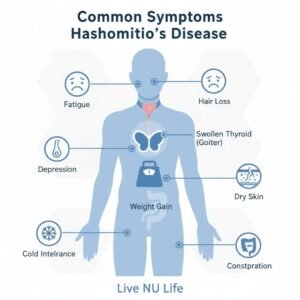
What are the common symptoms of Hashimoto’s disease?
Hashimoto’s disease symptoms come when the immune system starts to attack the thyroid gland. People with this condition generally feel tired & weak all the time.
The thyroid gland gets damaged over time. This makes it hard for your body to make enough hormones. Many folks notice changes slowly.
Physical Signs You Might Notice
Your body gives clear signals when Hashimoto’s affects your thyroid:
- You may feel tired even after sleeping well
- You see a sudden weight gain without eating more food
- Getting cold easily, even in warm rooms
- Having trouble going to the bathroom regularly
- Skin becomes dry & rough to the touch
- Hair gets thin & breaks off easily
Body Changes & Pain
Hashimoto’s disease symptoms also affect how you move & feel:
- Muscles hurt & feel stiff, especially in hands & feet
- Joints become sore & hard to bend
- Face looks puffy or swollen
- Heart beats slower than normal
Other Warning Signs
Women might have heavy periods that last longer. Some people get a swollen neck area called a goiter. Memory problems & feeling sad can happen too.
Many people don’t notice Hashimoto’s disease symptoms at first. The changes happen slowly over months or years. Getting blood tests helps doctors find the problem early.
What causes Hashimoto’s disease, and who is at risk?
Hashimoto’s disease is a disease that happens when your immune system gets confused & starts attacking your thyroid gland, misunderstanding it as a danger to the body. Your thyroid gland is a small gland in your neck. This gland is important in making hormones to control how your body uses energy and how it functions.
What is the reason for Hashimoto’s disease?
Doctors don’t know the exact cause of this disease. But they do know several causes that make it more likely:
- Family genes – If someone in your family has thyroid problems, you might get it too
- Being female – Women get this disease 7 times more than men
- Age – People between the ages of 30 and 50 get it mostly.
- Other autoimmune diseases – Having conditions like diabetes or lupus can increase the risk
- Viruses – Some infections, like hepatitis C, can cause this disease
- Too much iodine – You may be getting too much iodine from food or medicine
Who has higher risk factors?
According to studies & research, if one of two twins has this disease, then the other twin also has a 50% chance of getting this disease. This proves genes play a big role in the causes.
People with Down syndrome or Turner syndrome also face higher risk factors. Living in very clean places with fewer germs might also increase your chances.
The disease affects about 7.5% of people worldwide, with women being hit much harder than men.
Explore the foundations of Health and Fitness for a stronger lifestyle.
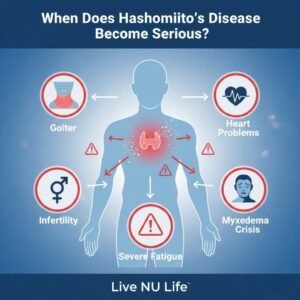
When does Hashimoto’s disease become serious?
Hashimoto’s disease becomes serious when your body can’t make enough thyroid hormone anymore. This happens slowly over time, not all at once.
Your thyroid gets damaged bit by bit. The disease starts mild but gets worse if you don’t treat it. Most people feel fine at first. But then problems start showing up.
Here’s when serious complications happen:
- Heart problems – Your heart beats funny & cholesterol goes up
- Goiter – Your neck swells up like a tennis ball is stuck there
- Mental health issues – You feel sad or depressed
- Pregnancy problems – Babies can have birth defects if the mom isn’t treated
- Myxedema coma – This is rare but can kill you. Your body shuts down
The disease becomes serious if you ignore it for years. About 5% of people with mild thyroid problems get worse each year.
Warning signs it’s getting serious:
- You’re always tired & cold
- Your voice changes
- You can’t think clearly
- Your periods, if women get heavy or stop
The good news? Treatment stops most complications before they get serious. But you need to catch it early & take your medicine every day.
Without treatment, serious complications can hurt your heart, brain & whole body.
Learn all about Legionnaires’ Disease: causes, symptoms, and more.
Discover effective strategies for Prevention of Legionnaires’ Disease.
What are the possible complications of untreated Hashimoto’s disease?
Untreated Hashimoto’s disease brings serious health risks that get worse over time. This autoimmune condition attacks the thyroid gland & leads to many body complications.
Heart & Blood Issues
The heart faces major problems when Hashimoto’s disease remains untreated. High cholesterol levels build up in the blood. This puts people at risk for heart disease & heart failure. The heart may get bigger than normal. Heartbeats can become uneven & weak.
Physical Changes
A goiter often forms as the thyroid grows bigger. While usually painless, large goiters make swallowing & breathing hard. People gain weight & feel tired all the time.
Mental Health Problems
Depression hits many people with untreated Hashimoto’s. The condition affects mood & thinking. Mental health issues get worse as time passes.
Pregnancy Risks
Women face serious pregnancy risks with this disease. The risk of miscarriage is high if women have this disease but are not well-treated. Babies may be born early or have defects from birth, like heart problems, brain issues, or a cleft palate.
Life-Threatening Condition
Myxedema coma is the most dangerous & fatal cause of this disease. This rare condition causes extreme sleepiness, low body temperature, & and loss of consciousness. Without emergency and early treatment, it can be fatal.
Getting proper treatment prevents these complications & helps people live normal, healthy lives.
How is Hashimoto’s disease diagnosed and treated?
Doctors find Hashimoto’s disease through simple tests. The treatment helps people feel better & live normal lives.
How Doctors Find It
Blood tests are the main way to spot Hashimoto’s disease. Doctors check these things:
- TSH levels – When this number is too high, it means your thyroid needs help
- T4 hormone test – Low levels show your thyroid is not working well
- TPO antibody test – This shows if your body is attacking your thyroid. Most people with Hashimoto’s have these antibodies
Sometimes doctors do a neck exam too. They feel for a bigger thyroid gland or lumps.
If antibody tests come back normal but you still have symptoms, an ultrasound might help. This picture test shows what your thyroid looks like inside.
Treatment Options
The main treatment is taking thyroid hormone pills every day. This medicine replaces what your thyroid can’t make anymore.
- Levothyroxine – This is the most common pill. You take it once each morning on an empty stomach
- Dose changes – Your doctor will adjust how much you take based on your blood tests
- Steroid medicine – Some people need this for a short time to reduce swelling
Most people need this treatment for life. Regular blood tests help doctors keep your hormone levels just right.
What diet helps in managing Hashimoto’s disease?
Managing Hashimoto’s disease gets easier with the right diet choices. This autoimmune condition needs careful eating to reduce swelling & support thyroid health.
A Hashimoto’s disease diet focuses on foods that fight inflammation. Anti-inflammatory foods work well for this condition. Your thyroid needs these foods to work better & feel good.
Good Foods for Hashimoto’s Disease:
- You can eat Fish like salmon & sardines (omega-3 helps reduce swelling)
- You can choose Berries, apples & citrus fruits (help remove toxins)
- Nuts & seeds like pumpkin seeds (give zinc for thyroid) are the best choices
- Green vegetables & non-starchy vegetables
- You can get Healthy fats from avocado & olive oil
- Beans & lentils (fiber helps gut health) are also very useful
Foods to Limit:
- Sugar & sweets (can cause more swelling)
- Gluten products (many people feel sensitive)
- Processed foods
The diet plan should include fiber-rich foods & anti-inflammatory choices. These foods help your body make hormones better & reduce autoimmune reactions.
Many people start to see improvements when they follow this diet for months. You can also ask and talk to your doctor about which diet works best for your specific needs.
Learn proven methods on How to Prevent Autoimmune Disease naturally.
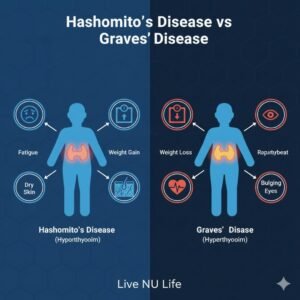
What is the difference between Hashimoto’s disease and Graves’ disease?
Both Graves’ disease & Hashimoto’s disease attack your thyroid gland. But they work in opposite ways.
Your thyroid makes hormones that control how fast your body works & generates energy. It is the gas house of your body.
Graves’ Disease: The Gas Pedal Gets Stuck
Graves’ disease makes your thyroid work too hard. It creates too many hormones. This speeds up everything in your body.
Common signs include:
- Weight loss even when eating more
- Fast heartbeat
- Feeling hot & sweaty
- Shaky hands
- Trouble sleeping
- Bulging eyes
Hashimoto’s Disease: The Gas Pedal Stops Working
Hashimoto’s does the opposite. It damages your thyroid so it can’t make enough hormones. This slows everything down.
Common signs include:
- Weight gain
- You can feel tired all the time
- Feeling cold
- Your Hair may lose or get thin
- You can feel sad or down
Who Gets These Diseases?
Women get both diseases more than men. Graves’ disease usually starts after age 30. Hashimoto’s typically begins between the ages of 30 and 50.
Both diseases run in families. If someone in your family has one, you might get it too.
Treatment is different, too
Graves’ disease treatment tries to slow down the thyroid. Doctors use medicines or special treatments to stop it from making too many hormones.
Hashimoto’s treatment gives you the hormones your thyroid can’t make. You take pills every day to replace what’s missing.
Both diseases can be managed well with proper medical care. Delve deeper into the science and impact of Mycobacterium tuberculosis, the bacterium responsible for tuberculosis.
Learn more in detail about Hashimoto’s thyroiditis from Wikipedia.
FAQs
Q1: What is Hashimoto’s disease?
Hashimoto’s disease attacks your thyroid gland, but by mistake or out of confusion. Your immune system fights your own body. This makes your thyroid stop working properly. It can’t make enough hormones.
- Your body treats thyroid cells like enemies
- White blood cells build up in the thyroid
- The gland gets damaged over time
- Hormone production drops slowly
Q2: What are the main symptoms?
Early stages may have no signs. Later, you feel tired & gain weight. Your skin gets dry & you feel cold all the time.
- Extreme tiredness that doesn’t go away
- Weight gain even with normal eating
- Dry skin & hair that breaks easily
- Feeling cold when others feel warm
- Constipation & joint pain
Q3: How do doctors find Hashimoto’s disease?
Doctors use blood tests & other tests to check your thyroid. They look for special antibodies called TPO. High TSH levels also show problems.
- The TSH test shows if the thyroid is working
- The T4 test checks actual hormone levels
- TPO antibody test confirms Hashimoto’s disease
- Physical exam checks for neck swelling
- Sometimes, an ultrasound shows gland damage
Q4: Can Hashimoto’s disease be cured?
There is no cure for Hashimoto’s disease. But doctors can replace missing hormones with pills. Most people take levothyroxine medicine every day.
- Daily hormone replacement pills work well
- Treatment continues for your whole life
- Medicine restores normal body functions
- Regular blood tests check if the dose is right
- Symptoms get better with proper treatment
Q5: Who gets Hashimoto’s disease the most?
Women get Hashimoto’s disease 10 times more than men. It usually starts between the ages of 30 and 50. Having other immune diseases raises your risk.
- Affects about 5 in 100 Americans
- Family history increases your chances
- More common in white populations
- Other autoimmune diseases raise the risk
- Stress & infections may trigger it

